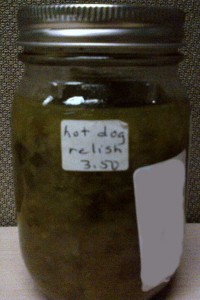I make some pretty decent family-sized dishes and preserves in my home kitchen. Armed with a digital tip-sensitive thermometer tested recipes and a pH meter I do my best to ensure the stuff I make hits safe thresholds.
But I’m probably not in the norm. 
Just because I’ve got some of the food safety know-how and the tools doesn’t mean I’m suited for large-scale food production just like making a killer bbq sauce or paella doesn’t automatically qualify one to go into the commercial food making business. To get into that gig I’d need to learn how to deal with time pressures and complications involved with making a whole bunch food. The star paella-maker would need to know how to ramp up production, how to cook/cool/transport and reheat the dishes safely. Putting together a safe product involves having the skill to make something tasty, making a lot of it and paying attention to the risks.
In early November a vendor at the magical St. Jacob’s Farmers Market in Ontario, Canada recalled some hot dog relish (above, exactly as shown) due to health concerns. According to CFIA’s press release, Orange Blossom Farm recalled the product from marketplace because it may permit the growth of Clostridium botulinum.
Details are fuzzy (as they often are) but maybe the relish maker didn’t have any data to show the inspectors about acidification or process. Or the inspectors measured the pH of a batch of canned product and saw that it was high enough to allow for germination of bot spores into vegetative cells (which can grow produce the toxin). A hot dog relish producer should know how to control for botulism risks, and have data to back it up. And a farmers market manager/organizer should be checking that their vendors are following best practices.
According to the Canberra Times, new Australian food rules aimed at addressing amateur food producers by requiring anyone having more than five food events annually to participate in safe food handling training have been met with opposition from fundraising groups.
Not content with interfering in fund-raising barbecues, the ACT government’s food safety bureaucrats have turned their attention to school fetes, telling parents they cannot sell their homemade quiches any more.
The government has this month enforced bans on a list of popular home-made dishes, telling parents they cannot sell foods it has labelled ”high risk”. That list includes spring rolls, casseroles or any other dishes containing meat or dairy, such as cakes containing custard or cream.
ACT Health also has no data on food poisonings at school fund-raising events but earlier this month surprised parents running two stalls at one of the capital’s most popular fetes when it blocked them from selling certain dishes they planned to make at home.
It can be revealed a humble quiche lorraine almost undid the well-meaning plans of one of the French stalls at the fete held by French-speaking Telopea Park School because it contained cream.
Humble or not, quiche lorraine (or other dishes) can lead to illnesses and outbreaks if the folks who are making them don’t know what risks to control, how to do it and verify.
